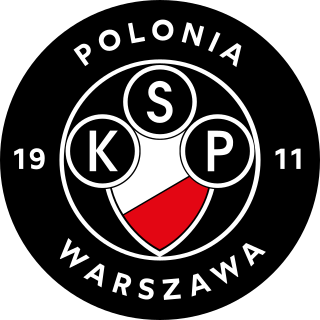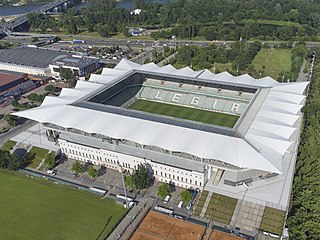
Legia Warszawa, commonly referred to as Legia Warsaw or simply Legia, is a professional football club based in Warsaw, Poland. Legia is the most successful Polish football club in history, winning record 15 Ekstraklasa champions titles, a record 20 Polish Cup and 5 Polish Super Cup trophies. The club's home venue is the Polish Army Stadium. Legia is the only Polish club never to have been relegated from the top flight of Polish football since World War II.

Polonia Warsaw, founded on 19 November 1911, is the oldest existing sports club in Warsaw, the capital of Poland, best known for its football and basketball teams. It also has track and field, swimming, chess, mountain biking, and contract bridge sections. Historically it also had sections in ice hockey, fencing, tennis, volleyball, hazena, cycling and boxing.

The Polish Cup in football is an elimination tournament for Polish football clubs, held continuously from 1950, and is the second most important national title in Polish football after the Ekstraklasa title. Due to mass participation of teams, the tournament is often called The Cup of the Thousand Teams.

The Polish Super Cup is an annually held match between the champions of the Ekstraklasa and the Polish Cup winners or, if the Ekstraklasa champions also win the Polish Cup, the Cup's runners-up. As of 2023, the Polish Super Cup has been played 33 times. The most successful club is Lech Poznań, who won 6 times. The most common participant are Legia Warsaw, as they played fourteen final games and have lost their eight following finals since 2012. Unlike in Polish Cup, there is no extra time played in the competition, therefore in case of a draw after regular time match goes straight into a penalty shoot-out.

Warsaw is home to one major professional football club and a number of smaller clubs. The only one currently playing in the first division (Ekstraklasa) is Legia Warsaw.

The Polish Army Stadium, official named the Marshall Józef Piłsudski Legia Warsaw Stadium, is an all-seater, highest fourth category football-specific stadium located at 3 Łazienkowska Street in the Śródmieście district, Powiśle area, within the square of the streets: Łazienkowska, Czerniakowska, Kusocińskiego and Myśliwieck. It is the home ground of Legia Warsaw football club, who have been playing there since 9 August 1930.
The 2010–11 Polish Cup was the fifty-seventh season of the annual Polish football knockout tournament. It began on 21 July 2010 with the first matches of the Extra Preliminary Round and ended in 2011 with the Final. The winners qualified for the third qualifying round of the 2011–12 UEFA Europa League. Jagiellonia Białystok were the defending champions, having won their first title in the season before.
Poland Ekstraklasa, meaning "Extra Class" in Polish, named PKO Bank Polski Ekstraklasa since the 2019–20 season due to its sponsorship by PKO Bank Polski, is the top Polish professional league for men's association football teams.
The 2011–12 Polish Cup was the fifty-eighth season of the annual Polish football knockout tournament. It began on 19 July 2011 with the first matches of the extra preliminary round and ended on 24 April 2012 with the final. The winners qualified for the second qualifying round of the 2012–13 UEFA Europa League.
Legia Warsaw II, in Poland known as Legia II Warszawa, is a Polish football team, which serves as the reserve side of Legia Warsaw. They compete in the III liga, the fourth division of Polish football, and play their home matches at the Legia Training Center in Książenice, Grodzisk Mazowiecki Commune, Masovian Voivodeship.

Żyleta is a common name of a northern stand at the Stadion Wojska Polskiego in Warsaw, Poland, traditionally occupied by the most spontaneous and fanatical fans of Legia Warsaw football club. Before the stadium renovation (2008–2011), the "old" Żyleta referred only to the center section within the eastern stand of the stadium. There is a special exhibition dedicated to the "old" Żyleta in the Legia club museum. Today, after the stadium renovation, the "new" Żyleta means the whole northern stand of stadium.
The 2014–15 Polish Cup was the sixty-first season of the annual Polish football knockout tournament. It began on 19 July 2014 with the first matches of the extra preliminary round and ended on 2 May 2015 with the Final, in which Legia Warsaw defeated Lech Poznań for a record 17th title. As winners, Legia qualified for the qualifying tournament of the 2015–16 UEFA Europa League.
Legia Warszawa, known in English as Legia Warsaw, is a Polish multi-sports club based in Warsaw, Poland.

The following is a timeline of the history of Warsaw in Poland.
The 2015–16 Polish Cup was the sixty-second season of the annual Polish football knockout tournament. It began on 18 July 2015 with the first matches of the preliminary round and ended on 2 May 2016 with the final at the National Stadium in Warsaw. Winners of the competition qualified for the qualifying tournament of the 2016–17 UEFA Europa League.
The 2014 Polish Super Cup was held on 9 July 2014 between the 2013–14 Ekstraklasa winners Legia Warsaw and the 2013–14 Polish Cup winners Zawisza Bydgoszcz. Zawisza Bydgoszcz won the match 3–2, winning the trophy for the first time in their history.
The 2012 Polish Super Cup was held on 12 August 2012 between the 2011–12 Ekstraklasa winners Śląsk Wrocław and the 2011–12 Polish Cup winners Legia Warsaw. Śląsk Wrocław won the match on penalties after the match finished 1–1, winning the trophy for the second time in their history.
The 2020–21 Legia Warsaw season was the club's 104th season of existence, and their 84th in the top flight of Polish football.
The Polish League Cup was a short lived cup competition in Poland spanning three editions from 1999 to 2002.
In Polish football there have been four different League Cups with varying levels of success, but all were short-lived competitions, held irregularly over the years. The league cup competitions focused mainly on top division teams, in contrast to that of the Polish Cup which allows teams much lower down in the footballing pyramid to compete. The four League Cup competitions played in Poland are; the Young Leaders Rally Cup (1952), the League Cup (1977–1978), the Polish League Cup (1999–2002), and the Ekstraklasa Cup (2006–2009), the former three being organised by the Polish Football Association while the most recent competition was organised by Ekstraklasa SA.









